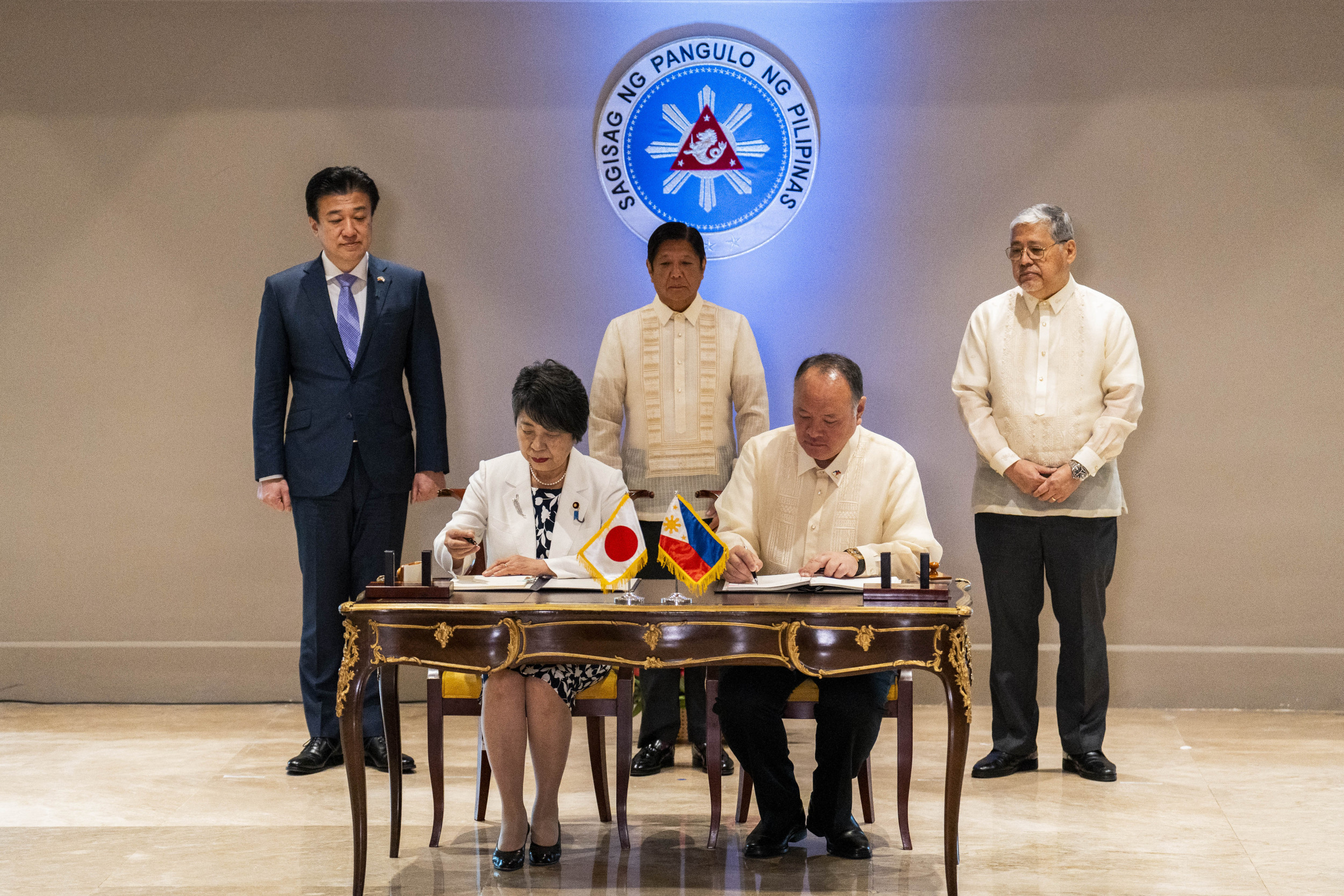Uncommon Knowledge
Newsweek is committed to challenging conventional wisdom and finding connections in the search for common ground.

Two U.S. allies in Asia signed a landmark bilateral defense pact on Monday, allowing greater troop access and deployment amid shared concerns about China’s ambitions in the East and South China seas.
The Reciprocal Access Agreement (RAA) signed in Philippines capital Manila between Japan’s Foreign Minister Yoko Kamikawa and the Philippines’ Defense Secretary Gilberto Teodoro provides a legal framework for the two countries to deploy military personnel to each other’s territory for training exercises and joint operations.
Under the agreement, Japan will be able to participate as a full member in the annual Balikatan drills between the United States and the Philippines, America’s oldest treaty ally in the region. In the past, Japan’s Self-Defense Forces have joined the exercise as an observer.
The Philippine coast guard has repeatedly clashed with its Chinese counterpart in the contested waters of the South China Sea this year, while in the East China Sea, Japan accused Chinese coast guard vessels of violating its territorial waters around Senkaku Islands, which is claimed by Beijing as the Diaoyu Islands.
Their territorial disputes with China, and Beijing’s assertive behavior in the region, have brought Manila and Tokyo together to deepen security cooperation and further overcome their shared wartime history, with the Philippines previously occupied by Japan from 1942-1945.

Philippines President Ferdinand Marcos Jr., who has embraced his country’s Mutual Defense Treaty with the U.S., described the defense pact as “very important” at a meeting with Kamikawa and Japan’s defense minister, Minoru Kihara.
Japan’s Foreign Ministry said in an announcement: “As the security environment in the region becomes increasingly severe, the signing of this important security-related agreement with the Philippines…will further promote security and defense cooperation between the two countries and firmly support peace and stability in the Indo-Pacific region.”
Chinese Foreign Ministry spokesperson Lin Jian said in Beijing on Monday that cooperation between countries should not “target or harm” the interests of third parties. The region does not need a “military bloc,” he said.
China‘s embassy in Manila did not immediately respond to a Newsweek email seeking comment.
The Philippines becomes the third country, and the first Asian nation, to strike a reciprocal access deal with Japan, after Australia in 2022 and the United Kingdom in 2023. Tokyo and Manila agreed last November to start RAA negotiations.
On X (formerly Twitter), Rahm Emanuel, the top U.S. envoy to Tokyo and an outspoken critic China, praised the historic deal, which he said reinforced “our collective deterrence and commitment to a free and open Indo-Pacific.”

Japan relaxed its arms trade policy in 2014 and in recent years has transferred a variety of military equipment to the Philippines to enhance the country’s capability to monitor its maritime domain.
The Philippine coast guard has put in service a dozen patrol ships provided by Japan since 2016, officially classifying them as multi-role response vessels. Two months ago, Japan extended a low-interest loan to the Philippines for the acquisition of five additional Japanese patrol vessels.
In 2018, the Japanese government delivered five TC-90 turboprop aircraft to the Philippines for maritime patrol activities. As of this April, the Philippine air force has received two of four mobile radar systems promised by Japan, in an agreement to provide Manila with real-time situational awareness and early warning capabilities.
Newsweek is committed to challenging conventional wisdom and finding connections in the search for common ground.
Newsweek is committed to challenging conventional wisdom and finding connections in the search for common ground.